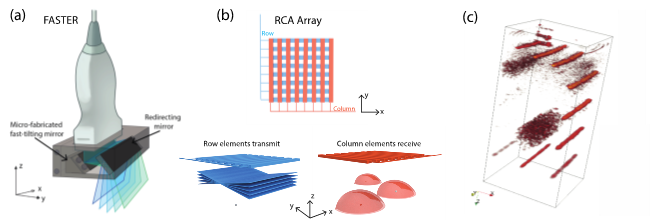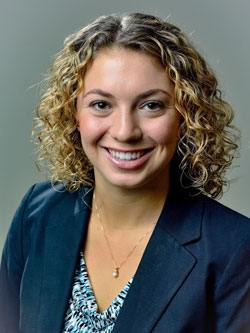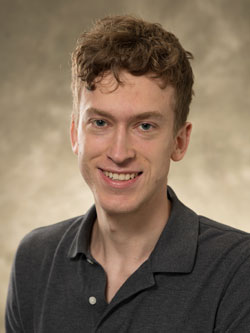Three graduate students will present their research at the next Beckman Graduate Student Seminar: Zhijie Dong, electrical and computer engineering; Justine Paul, materials science and engineering; and Paul Bogdan, psychology.
The event takes place Wednesday, Nov. 3 at noon. Register to attend on Zoom.
High volume rate 3D ultrasound imaging techniques
Zhijie Dong, electrical and computer engineering
 Image courtesy of Zhijie Dong.
Image courtesy of Zhijie Dong.Ultrasound imaging is ubiquitous owing to its safety, low cost, portability, and fast speed. However, conventional 2D ultrasound is limited in terms of accurate diagnosis and quantitative measurement due to the 3D nature of tissue. 3D ultrasound can mitigate these concerns by providing a more comprehensive evaluation and quantification of tissue structure. Many high volume-rate 3D ultrasound techniques have been introduced in the past two decades; however, a viable solution with low channel counts and fabrication costs remains elusive. In this talk, I will share our recent advances in 3D ultrasound imaging using two techniques: Fast Acoustic Steering via Tilting Electromechanical Reflectors, or FASTER; and row-column addressing arrays. Experimental results will be presented to demonstrate robust 3D imaging with high volume rates using proposed methods, which have a clear pathway for future clinical translations.
Biography
Zhijie Dong is a Ph.D. candidate in electrical and computer engineering under the direction of Professor Pengfei Song. His research interests lie in 3D ultrasound imaging and image processing. He received his undergraduate degree in information engineering from Southeast University and a master’s degree in electrical and computer engineering from the University of Michigan.
Investigating instabilities during frontal ring opening metathesis polymerization for functional materials
Justine Paul, materials science and engineering
 Justine Paul.In this work, we utilize a rapid, energy efficient manufacturing technology; frontal ring opening metathesis polymerization, or FROMP, that is based on a thermally driven reaction-diffusion system to produce complex architectures in engineering materials. This research is aimed at establishing the experimental techniques and theoretical foundation needed to facilitate the hierarchical design and bottom-up assembly of multifunctional materials in a closed mold geometry that will enable the implementation of advanced materials concepts. It specifically focuses on controlling the frontal instabilities, such that complex synthetic systems are achievable. With control over the instabilities that arise during the frontal polymerization process, we can gain control over the change in temperature of the propagating front, enabling us to take advantage of thermally responsive chemistries to permanently pattern material properties in the resulting material based upon the thermal history. By further tuning the reaction kinetics and modifying the boundary conditions we can achieve spatiotemporal control of the resin temperature and enable fine-tuning of pattern development and evolution. The patterned material domains are then characterized by a range of techniques, including small angle x-ray scattering, NMR, differential scanning calorimetry, and nanoindentation.
Justine Paul.In this work, we utilize a rapid, energy efficient manufacturing technology; frontal ring opening metathesis polymerization, or FROMP, that is based on a thermally driven reaction-diffusion system to produce complex architectures in engineering materials. This research is aimed at establishing the experimental techniques and theoretical foundation needed to facilitate the hierarchical design and bottom-up assembly of multifunctional materials in a closed mold geometry that will enable the implementation of advanced materials concepts. It specifically focuses on controlling the frontal instabilities, such that complex synthetic systems are achievable. With control over the instabilities that arise during the frontal polymerization process, we can gain control over the change in temperature of the propagating front, enabling us to take advantage of thermally responsive chemistries to permanently pattern material properties in the resulting material based upon the thermal history. By further tuning the reaction kinetics and modifying the boundary conditions we can achieve spatiotemporal control of the resin temperature and enable fine-tuning of pattern development and evolution. The patterned material domains are then characterized by a range of techniques, including small angle x-ray scattering, NMR, differential scanning calorimetry, and nanoindentation.
Biography
Justine Paul is a fourth-year Ph.D. student in materials science and engineering. Her research in Nancy Sottos’ group focuses on the development of new manufacturing techniques that aim to fabricate functional materials utilizing a rapid, energy efficient polymerization process. She received her bachelor’s degree in bioengineering from Syracuse University in 2018. Paul received a Beckman Institute Graduate Fellowship in 2020. Outside of the lab, she enjoys spending time outdoors, golfing, running, boxing, skiing, cooking, and gardening.
Analyzing task-fMRI connectivity by repeatedly fitting classifiers in a structured fashion
Paul Bogdan, psychology
 Paul Bogdan.Analysis of the connectivity among brain regions increasingly relies on machine learning approaches. One popular method, referred to as connectome predictive modeling, involves fitting classifiers using the full brain and then carrying out post-hoc interpretations of the classifier to identify the networks underlying its predictive power. However, we considered a different approach: fitting multiple classifiers on different subsets of the brain. The subsets that yield classifiers that achieve significantly higher-than-chance accuracy reflect portions of the brain containing high information.
Paul Bogdan.Analysis of the connectivity among brain regions increasingly relies on machine learning approaches. One popular method, referred to as connectome predictive modeling, involves fitting classifiers using the full brain and then carrying out post-hoc interpretations of the classifier to identify the networks underlying its predictive power. However, we considered a different approach: fitting multiple classifiers on different subsets of the brain. The subsets that yield classifiers that achieve significantly higher-than-chance accuracy reflect portions of the brain containing high information.
The main challenges to this approach are: 1) classifiers trained on just small fractions of the brain tend to be less accurate; and 2) fitting multiple classifiers greatly raises the chance-accuracy significance threshold. Nonetheless, we tested our approach by applying it to a publicly available task-fMRI dataset. We demonstrated that by using repeated k-fold cross-validation (25 folds, 80/20 training/testing sets), we were able to overcome both challenges. We additionally showed that, relative to CPM, our approach yielded more interpretable, replicable, and diverse results. Critically, we limited our analyses to sample sizes representative of most neuroimaging studies (N = 50, 8 hours of scan time); hence, our findings suggest that this strategy is broadly accessible to neuroscience researchers.
Biography
Paul Bogdan is a fourth-year Ph.D. student in psychology. He is in the Cognitive Neuroscience area and works with Dr. Florin Dolcos and Dr. Sanda Dolcos. He is interested in applying computational methods to shed light on neuroscientific and psychological processes, particularly within the context of social cognition, memory, and emotion-cognition interactions. Last year, he was awarded the Thomas and Margaret Huang Graduate Fellowship to support this line of research.